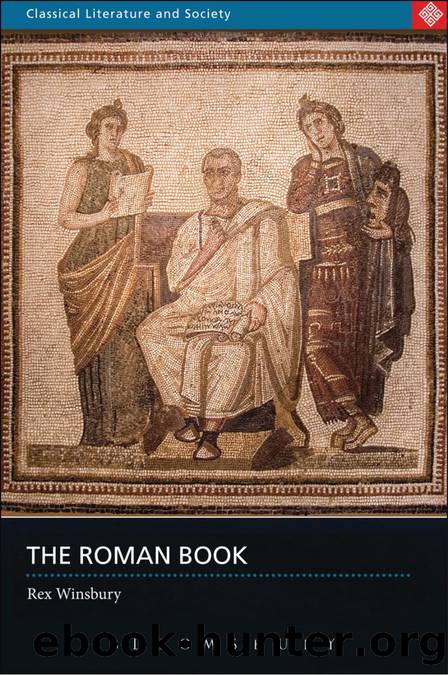The Roman Book by Winsbury Rex;

Author:Winsbury, Rex;
Language: eng
Format: epub
Publisher: Bloomsbury Publishing Plc
Published: 2019-12-17T16:00:00+00:00
Abandoned â or escaped?
With hand-copying and private handing-around as the main technical means of survival, Roman writers were acutely aware of the wide gamut of hazards that faced their new work once it was launched by means of a recitatio, although some of those hazards lay too far in the future for them to imagine.
Horace wrote, âyou can always delete what you havenât handed around: but once your words are sent out, you canât recall themâ.3 Martial warns his own book that it might be safer to stay at home â tutior domi.4 That was the only sure defence against being relegated to what Catullus â referring of course to another authorâs work, the Annals of one Volusius, and not to his own â calls cacata charta â crap paper.5 Copies of your composition could just end up as wrapping paper on the market stalls, for fish or incense or pepper.6 Horace warns the bearer of some of his poems to Augustus not to sweat too much onto them, and not to trip over when carrying them â soiled copies in a hot climate and dirty streets can all too easily be imagined.7 Or copies could end up â horror of horrors â as rough-sheets for schoolboys.8
Writers therefore speak of the moment when a work is âabandonedâ to the mercy (or otherwise) of readers/users, when control of it is lost in a world without intellectual property rights, as a moment of loss or even sadness, compared by some writers to the abandoning of an infant or the giving over of a child to a tutor, or the putting out of a child for adoption, even the surrendering of a daughter by a father who has hitherto kept her safe at home under lock and key, whether into marriage or, as some hint, into a life of prostitution.9 Indeed, there is a strong sense conveyed sometimes that what we today might, with pride, call âpublicationâ was seen by some Romans as exactly that â an act of prostituting their work.10 Writers also often used metaphors or phraseology deriving from slavery to describe âpublicationâ. Pliny talks of verses breaking free of their author like a runaway slave.11 Martial refers to his work as âfleeingâ like an escaping slave, and calls his book a verna, the Latin term for a slave born in the house and so born into slavery.12 Such vivid terminology gains its force not only from Rome as a slave society, but also as a literary society in which literate slaves were the enabling infrastructure of book composition itself.
Download
This site does not store any files on its server. We only index and link to content provided by other sites. Please contact the content providers to delete copyright contents if any and email us, we'll remove relevant links or contents immediately.
| Africa | Americas |
| Arctic & Antarctica | Asia |
| Australia & Oceania | Europe |
| Middle East | Russia |
| United States | World |
| Ancient Civilizations | Military |
| Historical Study & Educational Resources |
Magic and Divination in Early Islam by Emilie Savage-Smith;(1531)
Papillon by Henry Charrière(1421)
Bohemians, Bootleggers, Flappers, and Swells: The Best of Early Vanity Fair by Bohemians Bootleggers Flappers & Swells- The Best of Early Vanity Fair (epub)(1394)
Ambition and Desire: The Dangerous Life of Josephine Bonaparte by Kate Williams(1383)
Twelve Caesars by Mary Beard(1311)
Operation Vengeance: The Astonishing Aerial Ambush That Changed World War II by Dan Hampton(1155)
What Really Happened: The Death of Hitler by Robert J. Hutchinson(1154)
London in the Twentieth Century by Jerry White(1142)
The Japanese by Christopher Harding(1129)
Time of the Magicians by Wolfram Eilenberger(1125)
Twilight of the Gods by Ian W. Toll(1112)
Lenin: A Biography by Robert Service(1072)
The Devil You Know by Charles M. Blow(1022)
A Social History of the Media by Peter Burke & Peter Burke(968)
Freemasons for Dummies by Hodapp Christopher;(963)
Napolean Hill Collection by Napoleon Hill(936)
Henry III by David Carpenter;(919)
The Churchill Complex by Ian Buruma(906)
The Rise and Triumph of the Modern Self by Unknown(904)
